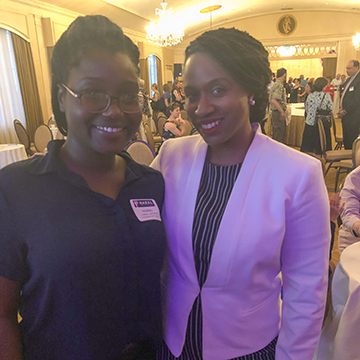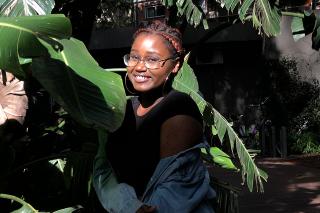What inspired you to pursue your majors and minor?
Because I intend to go to law school after Simmons, I knew that my undergraduate experience could be whatever I wanted it to be. So, I chose majors that catered to my interests and passions: Africana studies and political science with a minor in history.

I’m passionate about Black history and the African diaspora. I always understood that my identity as an immigrant, Black woman from a low-income household was politicized through no effort of my own. It was natural to me that I learn more about why and how this came to be. Africana studies and political science allow me to piece together why and how I have to move through life in the way that I do. I’ve also learned about identities outside of my own and understand how all the moving parts of politics and Blackness in all contexts have converged to shape our world today.
I pursued a minor in history because I have always found solace in the fact that we know how everything turned out from our vantage point in the future, but it still always feels like you discover something new every time you look into the past.
Tell us about your project: "The Futility of Respectability Politics in Combating Stereotypes of Black Women."
My project endeavors to use the early 2000s show Girlfriends created by Mara Brock Akil to investigate Black women’s engagement in respectability politics by attempting to reject the commonly known stereotypes of Black women. These four stereotypes are the Sapphire, the Mammy, the Matriarch, and the Jezebel. By drawing parallels to real political figures, I make the case that Black women continue to be pigeonholed into one of the four stereotypes despite their attempts to act politely or quietly because of the prejudice that is interwoven into our society.
For example, despite the soft gravelly tone of Ayanna Pressley’s voice, she is continuously painted out to be an angry Black woman by the media. Despite Anita Hill’s status as a Professor at the University of Oklahoma, she was still considered overtly sexual and was clearly a lustful Black woman trying to tarnish Clarence Thomas’ reputation. Rosa Parks, despite her and her family’s legacy of civil rights work, is often stereotyped as a Mammy.
So, this begs the questions “Why bother?” and “How can Black women live authentically without being forced into those stereotypes?”
It's in answering these questions that Girlfriends comes into play. Girlfriends experienced backlash because it portrayed Black women as rejecting respectability politics and choosing realism, but it was also embraced and memorialized for that same reason. Girlfriends resonates with viewers even 20 years later who are trying to find representation that doesn’t force them into spaces of what they should be, and simply illuminates the trials and tribulations of navigating life as a Black woman. In this greater discussion, my paper goes on to make connections between the tangible political effects of having role models both on and off the screen who live authentically and without concern of white respectability.
The paper hopes to create a space for conversation about leaving behind the outdated notion of changing yourself to be accepted and instead to exist as you are in order to change to what is considered acceptable.
I learned to push my academic limits during a time of turmoil and uncertainty worldwide, and I am incredibly grateful and proud of that experience.
What did you learn from this experience?
I learned so much about the topic and theories, but the most informative lesson was a personal one about perseverance. There were so many moments when I simply wanted to give up. I discussed giving up with my advisor so many times, but I was supported and reassured along the way about the amount of work that I had put in, and the payoff was much more worthwhile. I learned to push my academic limits during a time of turmoil and uncertainty worldwide, and I am incredibly grateful and proud of that experience.
If there were one thing you'd like us to learn from your project, what would that be?
I’d like it if people learned to critically evaluate the sources of media they consume and consider the ramifications of the different types of representation on the screen. Are characters being portrayed authentically or are they just inserted into the narrative for the sake of diversity and subjected to harmful stereotypes? Are our elected officials living authentically or are they forced to try to reach unattainable standards of professionalism that impact their ability to lead? How can we, as an electorate and as consumers of popular media, become more conscious and use our power to force representation in all aspects to be more, for lack of a better word, representative of all identities?
What inspired you to apply for the Undergraduate Symposium?
I was inspired to apply on the advice of my advisor Professor Doherty. I think that with all the difficulties I faced during the project, it was important to give me a space to share my work and show how much effort I had put into it. It also provides me with the feeling that my contribution to the body of knowledge in political science is tangible because I get to have a forum to share my work.
How did it feel to receive the 2020 Ellen Paradise Fisher Activism in Action Award?
The Ellen Paradise Fisher Award was an honor I received almost entirely by surprise. My tenure as an intern with NARAL Pro-Choice Massachusetts was amazing and afforded me many opportunities for activism including working on different campaigns and organizing. I was already super grateful for the opportunity to work with so many amazing women at NARAL, but it was great that they thought that the work I did both for and outside of the organization was important enough to warrant an award.
As of today, I’ve held a two-and-a-half-year internship, worked on two campaigns, headed an organization on campus, and participated in many other organizing and scholarly activities. I sometimes forget about these things because it feels like second nature for me to get involved. It can sometimes be very draining work because I was in school full time and have held at least two jobs at a time throughout my college experience. It was great to be recognized for my work, but also to be given the motivation to continue.
Do you have a favorite Simmons memory?
My favorite Simmons memory is something very small. I remember lamenting to Carlos from Bartol about how much I missed Caribbean food because I did not have time to go home and my mother was too busy to bring me food. He ended up incorporating some Dominican food, mangu, and carne guisada into the menu to make me feel more at home. Unfortunately, he is no longer working at Simmons, but that encapsulates the general feeling I got at Simmons from everyone I interacted with on a daily basis. I felt cared for in that moment, I feel cared for now in my final few weeks as a Simmons student, and I know I will be cared for as a Simmons alumna because of the bonds I formed at Simmons.

